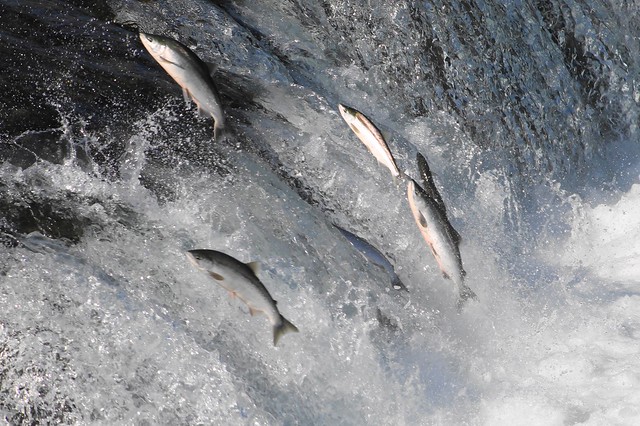Words for salmon in the Celtic languages. The species of salmon most common found around Celtic speaking lands is the Atlantic salmon (Salmo salar). Other species of salmon are available.
There are three words for salmon in Proto-Celtic: *esoxs / *esāk, *φenk-īnjo and *φorko. Only the first one has descendents in the modern Celtic languages.
| Proto-Celtic | *esoxs / *esāk = salmon |
|---|---|
| Gallaecian | *īsis = salmon |
| Gaulish | *esoks = salmon |
| Old Irish (Goídelc) | eo [eːo̯] = salmon |
| Irish (Gaeilge) | eo [oː / ɔː] = salmon; noble being, prince |
| Scottish Gaelic (Gàidhlig) | eò [jɔː] = salmon (archaic) eog = salmon |
| Proto-Brythonic | *esāx = salmon |
| Middle Welsh (Kymraec) | ehawc = salmon |
| Welsh (Cymraeg) | eog [ˈɛ.ɔɡ / ˈeː.ɔɡ] = salmon, sea-trout, sewin, samlet |
| Old Cornish | ehoc = salmon |
| Cornish (Kernewek) | eghek = salmon |
| Middle Breton | eheuc = salmon |
| Breton (Brezhoneg) | eog = salmon |
Etymology: possibly from the Proto-Indo-European *peysḱ- (fish).
| Old Irish (Goídelc) | bratán = salmon |
|---|---|
| Irish (Gaeilge) | bradán [bˠɾˠəˈd̪ˠaːn̪ˠ / ˈbˠɾˠad̪ˠaːnˠ / ˈbˠɾˠɑd̪ˠɑnˠ] = salmon |
| Scottish Gaelic (Gàidhlig) | braden [bradan] = salmon |
| Manx (Gaelg) | braddan = salmon |
Etymology: from the Old Irish brat (captivity, bondage, robbery) and án (diminutive suffix).
| Welsh (Cymraeg) | samon / samwn = salmon |
|---|---|
| Cornish (Kernewek) | sowman = salmon |
| Breton (Brezhoneg) | somon = salmon |
Etymology: from the English salmon, from the Middle English samoun, samon, saumon (salmon), from the Anglo-Norman saumon (salmon), from the Old French saumon, from the Latin salmō (salmon), either from the Proto-Celtic *esoxs / *esāk, or from the Latin saliō (to leap).
Sources: Wiktionary, Am Faclair Beag, MacBain’s Dictionary, In Dúil Bélrai English – Old-Irish Glossary, teanglann.ie, On-Line Manx Dictionary, Geiriadur Prifysgol Cymru, Gerlyver Kernewek, Dictionnaire Favereau, TermOfis











